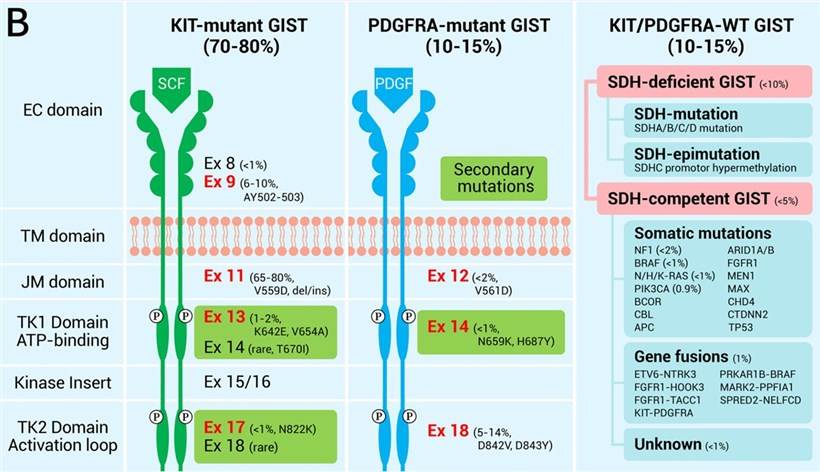Gastrointestinal Stromal Tumor (GIST)
- Home
- Solutions
- By Diseases
- Intestinal Diseases
- Gastrointestinal Stromal Tumor (GIST)
Gastrointestinal stromal tumor (GIST) stands as a formidable challenge within the medical realm, with its genesis rooted in intricate gene mutations that unfurl a convoluted network of pathogenic factors. Our company has professional technology and experience in the diagnosis and therapeutics of rare gastrointestinal diseases like GIST, enabling us to decode the complex molecular landscape of GIST, paving the way for a new era of personalized therapeutics.
Gastrointestinal stromal tumor (GIST) is a rare form of tumor that primarily affects the gastrointestinal tract, with incidences globally standing at around 1 in every 100,000 individuals. The most common locations for these tumors are the stomach and small intestine, leading to symptoms such as gastrointestinal obstruction, pain, and bleeding, among others (Fig.1).
 Fig.1 The anatomic distribution of GIST. (Li, B., et al., 2023)
Fig.1 The anatomic distribution of GIST. (Li, B., et al., 2023)The diverse spectrum of mutations observed in GIST individuals gives rise to distinct molecular subtypes, each with unique biological characteristics and implications. These subtypes serve as the foundation for developing individualized therapeutic plans that target the specific genetic alterations driving tumor growth.
In the realm of GIST pathogenesis, the majority of individuals exhibit activated mutations in crucial genes such as c-KIT (CD117) and PDGFRA receptor tyrosine kinases. These mutations drive tumorigenesis and serve as important therapeutic targets. However, a subset of GIST cases, known as wild-type GIST (WT-GIST), present without mutations in KIT and PDGFRA (Fig.2). These tumors may harbor mutations in genes like Succinate dehydrogenase (SDH)-dependent or be associated with neurofibromatosis type 1 (NF1).
 Fig.2 The genomic distribution of GIST. (Li, B., et al., 2023)
Fig.2 The genomic distribution of GIST. (Li, B., et al., 2023)Small Molecule Drug Therapy
Therapeutics for GIST typically involve surgery to remove the tumor, followed by targeted therapy using small molecule drugs such as imatinib, sunitinib, or regorafenib to inhibit the growth of the tumor and prevent a recurrence. Advances in targeted therapies have significantly improved outcomes for individuals with GIST.
Gene Therapy
Gene therapy aims to introduce genetic material into the tumor cells to target specific genes or pathways involved in tumor growth and survival. Incorporating advanced gene editing technology and small interfering RNA offers a revolutionary approach to target and normalize gene expression abnormalities in GIST.
Immunotherapy
Immunotherapy has shown promise in treating GIST by enhancing the body's immune response against the tumor. The therapeutic antibodies targeting programmed cell death protein 1 (PD-1), cytotoxic T-lymphocyte antigen-4 (CTLA-4), and small molecule inhibitors such as IDO inhibitors can alter the immune environment.
Our company has been committed to the development and research of rare gastrointestinal disease diagnostic and therapeutic platforms. By leveraging cutting-edge technologies and insights, we aim to revolutionize the management of GIST, ushering in a new era of personalized therapeutics that holds immense promise for enhancing individual care and outcomes.
The animal models can help researchers understand the molecular mechanisms underlying GIST development and progression, as well as test potential therapeutic strategies. Our company can offer animal models to meet your specific research needs.
| Xenograft Models | |
| The xenograft model of GIST involves the implantation of human GIST tumor cells or tissues into immunocompromised mice. This allows researchers to study the growth and behavior of GIST tumors in a controlled laboratory setting. | |
| Optional Models | GIST882 model, UZLX-GIST model |
| Genetically Engineered Models | |
| Some common mutations in the Kit gene that are associated with GIST include exon 11 mutations (such as deletions, substitutions, or insertions) and exon 9 mutations (such as duplications or deletions). By using techniques such as gene targeting, genome editing, or transgenic to build animal models with these specific mutations in the Kit gene. | |
| Optional Models | KitV558Δ/+ mouse model |
| Optional Species | Mice, Rats, Others |
With professional expertise and extensive experience in rare gastrointestinal disease diagnosis and therapeutics, our company is at the forefront of developing advanced therapeutic solutions for GIST and can provide animal models of GIST, to support your pharmacokinetics study and drug safety evaluation, providing help for more accurate and effective research and therapeutics of this complex disease.
If you are interested in our services, please feel free to contact us for more details and quotation information of related services.
References
All of our services and products are intended for preclinical research use only and cannot be used to diagnose, treat or manage patients.